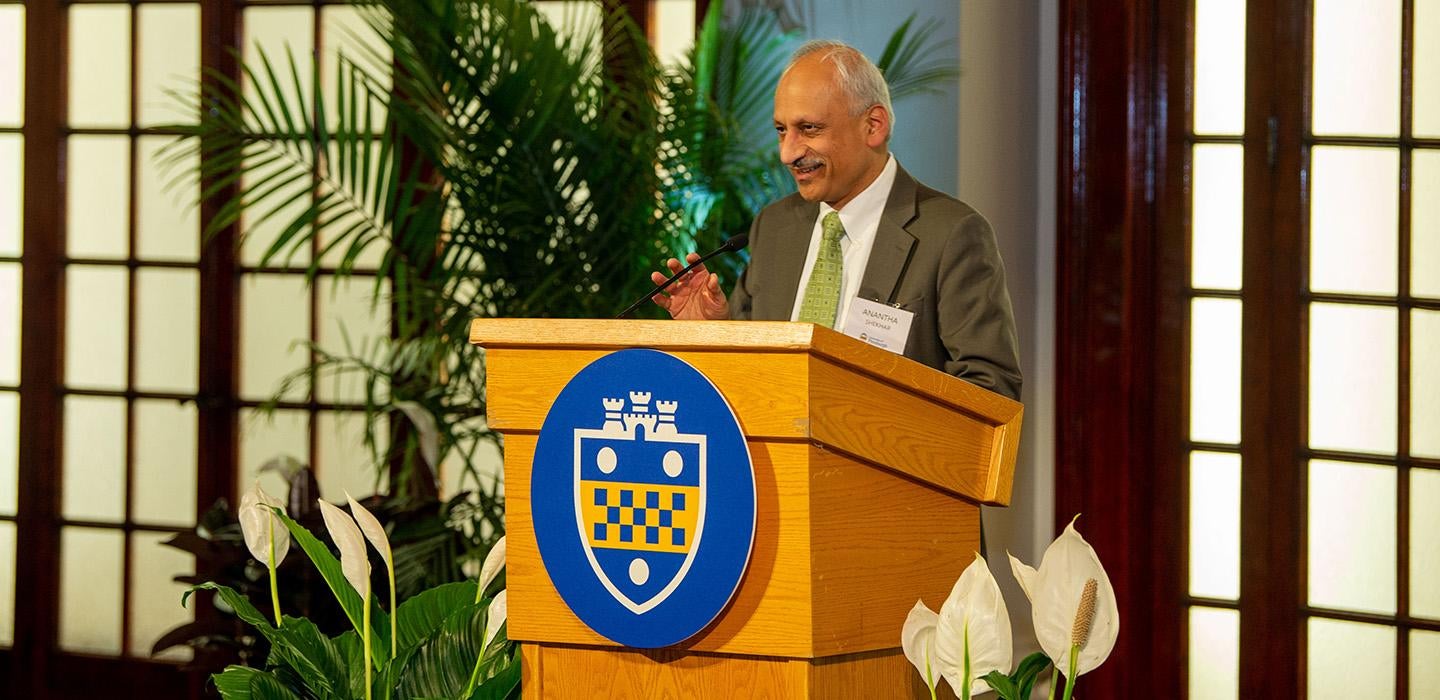
Subscribe to Pittwire Today
Get the most interesting and important stories from the University of Pittsburgh.Since Anantha Shekhar assumed the dual appointments of senior vice chancellor for the health sciences and John and Gertrude Petersen Dean of the University of Pittsburgh School of Medicine in 2020, he has emphasized excellence in education, biomedical research, translation and innovation, clinical care, equity and inclusion, and community engagement.
This September, at the most recent State of the School presentation, an annual event for the Pitt Medicine community to learn about updates in areas of operation and development, the dean delivered a “pulse check.”
Over the past two-and-a-half years, Pitt Medicine has met or exceeded established measurement criteria over eight key performance goals Shekhar set upon joining the University: research excellence; educational excellence; clinical excellence; translational excellence; community engagement and health equity efforts; faculty diversity, growth and leadership development; commercialization and production development; and interprofessional education.
Here are a few examples of success Shekhar cited during his presentation:
Research excellence
The University of Pittsburgh achieved a No. 3 overall ranking in National Institutes of Health (NIH) research funding; the School of Medicine achieved a No. 5 overall ranking in NIH research funding.
Educational excellence
The brand new Three Rivers Curriculum is being launched now for current classes of medical students, taught by the highest caliber educators to develop agents of change and leaders in science, education, clinical care and administration. The School of Medicine was also ranked No. 11 in primary care and No. 13 in research by U.S. News & World Report.
Clinical excellence
Pitt Medicine’s clinical partners at UPMC have been nationally ranked by U.S. News & World Report in nine adult specialties, regionally ranked No. 2 in Pennsylvania and No. 1 in Pittsburgh, and ranked high performing in three adult specialties and more than a dozen procedures and conditions.
Translational excellence
By strengthening the academic-clinical partnership between the University of Pittsburgh and UPMC, we are establishing our region as a hub for translational science. Jointly funded research leads to breakthrough discoveries, which can then be pushed to the bedside more efficiently with UPMC Enterprises, the commercialization arm of UPMC.
Community engagement and health equity efforts
The University’s unified health sciences approach has improved health and wellness in local and regional communities through interschool collaborations, including the Community Alliance Program, the Plain Community Translational Medicine Program and Clinic and the Healthy Home Laboratory. The schools of the health sciences also offer expanded care to community members in need.
Faculty diversity, growth and leadership development
The School of Medicine continues to emphasize recruiting leadership for the future. In addition to a redesign of the Office of Faculty Affairs, the School of Medicine has recently honored several faculty members with endowed chair appointments: Patricia L. Opresko has been appointed the Dr. Bernard F. Fisher Chair for Breast Cancer Discovery Science; Wendie Berg has been appointed the Dr. Bernard F. Fisher Chair for Breast Cancer Clinical Science; and Raquel Buranosky has been appointed the Leo H. Criep, M.D. Chair in Patient Experience.
Commercialization and product development
Thanks to a major investment from the Richard King Mellon Foundation, Pitt BioForge will define Pittsburgh as an international leader in life sciences translation. In addition to creating life-saving therapies for patients around the world, the biomedical manufacturing site will bring economic and educational opportunities to the region through local partnerships and community-centered development strategies.
Interprofessional education
After an initial learning forum, which featured students and faculty members from the six schools of the health sciences, an interprofessional curriculum was developed for health sciences students to work in small groups with a faculty facilitator through simulated situations. Before graduation, students will engage in practicum experiences ranging from street medicine, genetic counseling and free health care clinics to geriatric psychiatry, child advocacy and trauma care.
Based on the far-reaching success across the breadth of Pitt Medicine — and in collaboration with fellow Pitt schools of health sciences — the University of Pittsburgh will remain among the top tiers of premiere educational institutions and continue pushing the boundaries of biomedical science.
“I am so proud of everything every one of you here has done over the last three years. We have exceeded all of my goals. We have exceeded everyone’s expectations, despite challenging times,” Shekhar said. “I want to congratulate every one of you, and I couldn’t be happier standing here giving this report.”


